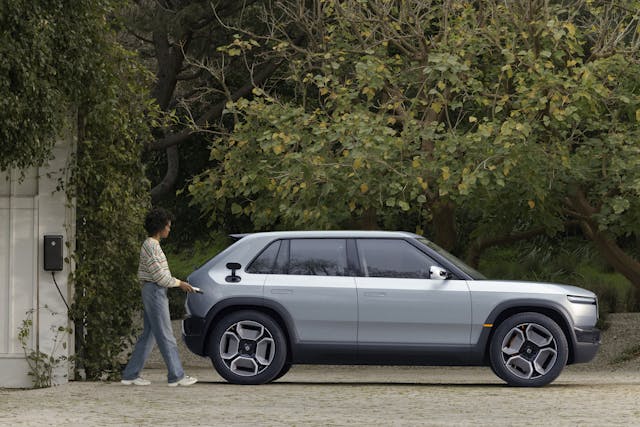Beleaguered Rivian, VW Ink Joint Venture
What do a California EV startup and a multinational automotive corporation have in common? If you answered “problems,” you get a gold star. As of yesterday, Rivian and VW Group have formally signed a joint venture, about five months after the deal was announced. Volkswagen is betting big that Rivian has what it needs—expertise in a new type of vehicle software. And Rivian? Rivian needs the cash.
The market’s initial reaction was quite positive: Rivian’s shares, which are down by 55 percent so far this year, jumped 11 percent. Part of the reason, surely, was because VW has upped the ante: In June of this year, when the two first publicized plans for the joint venture, VW promised up to $5 billion, and yesterday, it raised that figure to $5.8 billion. The other reason the shares rose? Relief, probably.
We’ll start with VW, the more familiar face of the two. You may have read on this site that the giant is considering closing three plants in its native land of Germany, and may lay off thousands. That’s only a snippet of the picture.

VW, like basically everyone except Toyota, had decided to focus on electric vehicles. It needed to build a new type of thing, one that relied heavily on software. Gasoline vehicles use software too, of course, for engine management and in-car navigation and the iPad-like displays that are now de rigeur. A gas vehicle might have over a hundred “electronic control units” (ECUs) to manage all these systems, and those systems might be made by dozens of different suppliers. If VW wanted to sell features to its customers after they purchased an electric vehicle (horsepower upgrades, new app integrations, subscriptions to semi-autonomous cruise control), it needed control of as much of the vehicle as possible, especially the software. And Rivian, the Irvine, California–based EV startup, had a pretty cool approach.

Rivian uses a “zonal” architecture for its software, which is exactly what it sounds like: Different areas of the vehicle get their own ECUs. (The alternative is designating a different ECU to a different type of job: Climate control, driveline mode, operating the doors and/or trunk.) Rivian did everything it could do to bring electronic and computer controls—think of them as a car’s nervous system—in-house. In doing so, Rivian made the car simpler: The first generation of the electrical architecture used 17 ECUs, and the second had only seven. As Popular Science reported back in August, the Gen II approach allowed Rivian to cut 1.6 miles of wiring and save 44 pounds.


You can imagine VW being jealous of such advancement. It was, in fact, desperate. In 2020 the conglomerate had formed its own software division. It developed VW.OS, the “nervous system” for VW’s much anticipated line of ID. vehicles (which include the resurrected Bus). In March of 2021, the division received the name of CARIAD, which unfortunately was an acronym, sort of: CAR, I Am Digital.
“CARIAD is developing solutions and products that will turn the car into a smart companion to accompany customers into the future with continuous updates and new digital features, even years later,” reads a release from March of 2021.
To make a long story short, things did not go well. Hop on a forum for VW’s electric vehicles today, and you don’t have to look long before you find frustrated customers. Most of their complaints, as The Verge wrote as far back as 2022, can be traced to buggy software.


Rivian, meanwhile, was bleeding cash. As of last quarter, it lost $1.17 billion. However stylish its vehicles, the company is struggling to turn a profit.
Will this joint venture change the destinies of Rivian and VW? Both companies will likely take any win they can get. Expect to see the fruits of their partnership in one of VW’s sub-brands: Scout Motors, which just announced a pickup and an SUV, which can be had with a pure electric driveline or with the addition of a small gas engine that serves as a generator to charge the battery on the go. (You can guess which powertrain customers want more.)

We’re especially curious to see what this joint venture might mean for VW infotainment systems. Rivian CEO RJ Scaringe has said that voice controls, not buttons, are The Future. We at Hagerty are a very button-loving bunch, but we’re intruiged by the boldness of Scaringe’s claims. So far, though some new cars allow you to change the driveline or control the doors, you usually can’t speak your way through every command you might have—or trust that the system understands what you’re saying the first time. Rivian may have the electrical architecture to pull off something like this. And now, it definitely has the cash.




Voice recognition?! Seriously, Siri and Alexa don’t understand me 1/2 the time, I cant imagine it in a car…